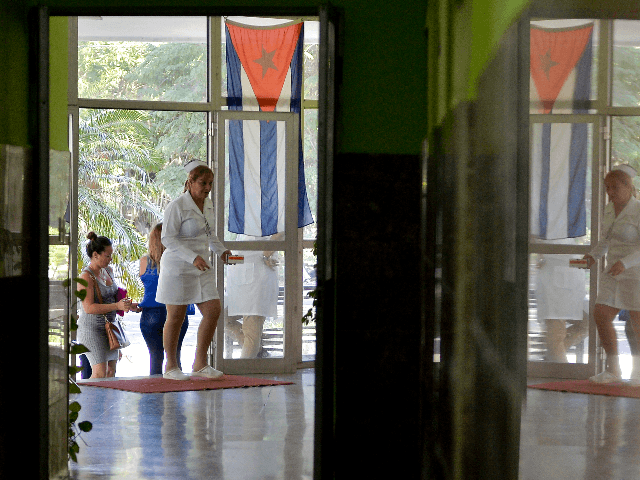The Communist Party of Cuba admitted on Thursday it was at risk for a Chinese coronavirus outbreak, as an allied nation of China’s that has openly courted Chinese tourism, and claimed to put into place a “prevention and control” plan in the event of an internal epidemic.
Cuba suffers from one of the world’s least functional healthcare systems, despite decades of American and European leftists touting Cuba as a pioneer in medical research. Misconceptions about Cuba’s failing medical infrastructure are the result of the Communist Party investing heavily in churning out undereducated slave doctors and forcing them to work in dangerous conditions abroad without a salary.
At home, doctors warn that Cuba is rapidly running out of the basic medical supplies necessary to run hospitals and clinics, and that children die of mysterious causes in poorly managed facilities.
Cuban propaganda newspaper Granma announced Thursday that 88-year-old dictator Raúl Castro – who as an octogenarian is at high risk of death if exposed to the Chinese coronavirus – led a Cuban Politburo meeting to discuss coronavirus response in the country that led to the implementation of the Plan for Prevention and Control. That plan, the newspaper continued, would consist of expanding the ability of Cuban agents at ports of entry to monitor those entering the country. Doctors would also be tasked with isolating and identifying cases of respiratory infections that may be coronavirus cases; the virus causes symptoms common with many other respiratory diseases such as influenza and the common cold, which is also a type of coronavirus.
It would also consist of a nationwide campaign to indoctrinate Cubans into full trust in their broken political system, so as to avoid dissidents contradicting any government statements that may appear dubious. Granma credited Cuba’s second-in-command, “President” Miguel Díaz-Canel, with explaining the latter part of the plan: “We have to generate an environment of trust and security in the population, the leader indicated, ‘to discard with uncertainty and contribute to preparation for the necessary citizenry participation in all actions of this plan.'”
Díaz-Canel asserted the plan approached the outbreak with “responsibility, seriousness, intelligence, observation, agility, efficiency, systematic control, and, above all, clarity in modes of activation in every possible scenario.”
Díaz-Canel said he believed that “threats exist and the danger of the new coronavirus being present in the country” was due to the presence of the virus in Latin America.
Granma also prepared for a potential coronavirus outbreak by publishing an article decrying “racism and xenophobia” on the part of unnamed capitalist nations for somehow worsening the outbreak. The column also criticized those seeking stronger American sanctions on Cuba given the government’s routine human rights abuses against pro-democracy dissidents, applauding the Cuban people for allegedly sharing the little they have.
“Here, in our Cuba, we hug and we kiss, we share and work, and we continue to hug,” the article concludes, promoting a variety of behaviors the World Health Organization (WHO) has deemed risky, given that the Chinese coronavirus is highly contagious.
No Latin American country has documented a Chinese coronavirus death at press time. Yet much concern exists that the virus may soon surface in Latin America’s most vulnerable countries: Cuba and its socialist allies, Venezuela and Nicaragua. All have close ties to the communist government in China and maintain regular contact with Chinese officials. China is the origin nation of the new coronavirus, first documented in the city of Wuhan and now present in every province of one of the world’s largest countries.
Cuba is one of the few Latin American countries to formally sign onto China’s Belt and Road Initiative (BRI), initially promoted as an infrastructure plan to rebuild the ancient Silk Road connecting China to western Europe. China has since expanded the plan to infrastructure projects all over the planet on dubious claims that Latin America and Africa were also once part of the ancient Silk Road.
The BRI consists largely of China issuing predatory loans to developing countries that those nations then invest in paying China to build new transportation infrastructure. In Cuba, that has manifested itself in the construction of a Chinese-built railway connecting Havana to Santiago de Cuba, the largest city in the east of the country.
“As socialist countries, China and Cuba are good friends, comrades, and brothers,” dictator Xi Jinping said of Cuba in November 2018, during Díaz-Canel’s visit to Beijing to sign onto BRI. “Chinese people will never forget that Cuba, led by Comrade Fidel Castro, was the first nation in the western hemisphere to forge diplomatic ties with China 58 years ago.”
To expand ties with the Chinese regime, Cuba has invested heavily in a tourism campaign throughout China. Last year, Cuba bought large billboards and bus advertisements in Beijing, Shanghai, and other major cities announcing special tourism deals for Chinese visitors during the 500th-anniversary celebrations of the founding of Havana.

COMMENTS
Please let us know if you're having issues with commenting.